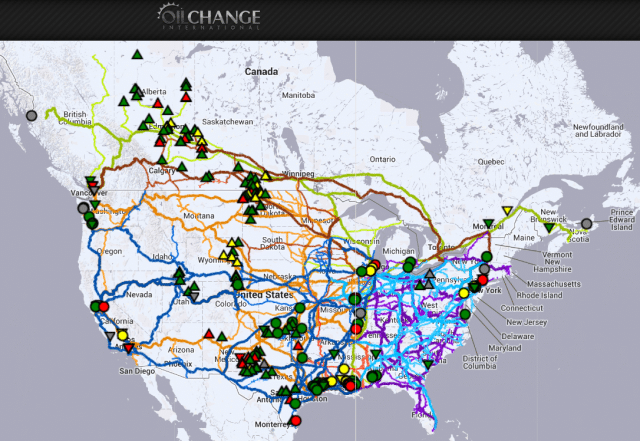A new report and website released today by Oil Change International provides a comprehensive overview of the current oil-by-rail industry in North America and it isn’t a pretty picture.
The report and interactive map of the “booming bomb train industry” capture the alarming scope of this very recent development. As the report points out, 70 times as much oil was moved by rail in 2014 as there was in 2005. That rapid expansion is continuing, placing more North American communities at risk.
“This analysis shows just how out of control the oil industry is in North America today. Regulators are unable to keep up with the industry’s expansion-at-any-cost
According to the report, Runaway Train: The Reckless Expansion of Crude By Rail in North America, approximately one million barrels of oil per day are moved on 135 trains of 100 cars or more each day in America. If all of the currently planned development of oil-by-rail facilities occurs, the full capacity to move oil would be five times that amount.
“This is what the All of the Above Energy Strategy looks like – a runaway train headed straight for North American communities,” Stockman said.
This massive investment by the oil and rail industries to expand their capacity to move oil by rail is one of the main reasons that improving oil-by-rail safety is unlikely when it comes to the unsafe DOT-111 tank cars. These cars currently make up approximately 70% of the oil-by-rail tank car fleet and there is currently a two to three year waiting list for companies wanting new tank cars.
The planned expansion of the oil-by-rail industry is simply impossible without the existing DOT-111 cars. In 2013 this point was made by an industry analyst:
“People who want to ship oil can’t get them,” Toby Kolstad, president of the consultant firm Rail Theory Forecasts LLC said. “They’re desperate to get anything to move crude oil.”
Without the oil-by-rail transportation option, the Bakken Shale oil would have no way to get to market. Despite the fact that the DOT-111 cars are inadequate and the Bakken crude is more explosive, the industry continues to rapidly expand with no new regulations.
The planned expansion of the industry and the current known capacity restraints help explain the recent public relations effort by the oil industry to dismiss any safety concerns.
Last week, the North Dakota Petroleum Council released a new study that said Bakken crude was “comparable in volatility to gas-rich oils from other shale formations in other regions.”
Which is true. However, in other regions, like the Eagle Ford formation in Texas, the natural gas liquids are stripped from that oil before being shipped by rail which greatly reduces the danger of explosion.
Last week, the American Fuel and Petrochemical Manufacturers also weighed in with their opinion. AFPM President Charles Drevna stated their position to Railway Age:
“As the standards are today for flammable liquids, Bakken crude fits right in, and the DOT-111 cars should be fine”
These claims are being made despite testimony by Robert Sumwalt of the National Transportation Safety Board calling the DOT-111’s an “unacceptable public risk” when used to transport Bakken crude.
Last week, the White House announced that the Pipeline and Hazardous Materials Safety Administration (PHMSA) will be proposing new oil-by-rail regulations in July. However, this will just be a proposal and the beginning of a likely contentious political battle about these regulations. No one expects any new regulations before 2015. Meanwhile, the industry continues its expansion plans.
In July, at the same time PHMSA is expected to announce its proposed new regulations for the oil-by-rail industry, activists across the country are planning a week of action. Starting on July 6th, the anniversary of the deadly explosion in Lac-Megantic, Quebec, the “Oil by Rail week of action” will highlight opposition to the shipping of oil by rail through communities and remember the victims of that first Bakken crude oil explosion.
In Lac-Megantic, there is little good news. The town is facing years of clean-up and reconstruction, and billions of dollars of expenses to deal with that disaster. Recently, Réjean Roy, whose daughter died in that accident, talked about the reality of Lac-Megantic’s current situation and their need to try to revive the town’s tourism industry.
“We need it for my town, because my town is dying. If we do nothing to attract tourists here, the town will die.”
A town will die. But the oil-by-rail industry is booming and regulations are not coming any time soon. It will take a huge public outcry to change that.
Stockman, author of the Oil Change International report, remains hopeful that the tide could turn.
“Communities are already waking up to the dangers of oil trains barreling through their backyards, with spills, explosions and derailments happening all too often. This report and online tool will help provide the critical information that’s been sorely missing in order to shine a light on what’s really going on, and to help stop the runaway train of crude-by-rail in its tracks before more damage is done.”
Subscribe to our newsletter
Stay up to date with DeSmog news and alerts






